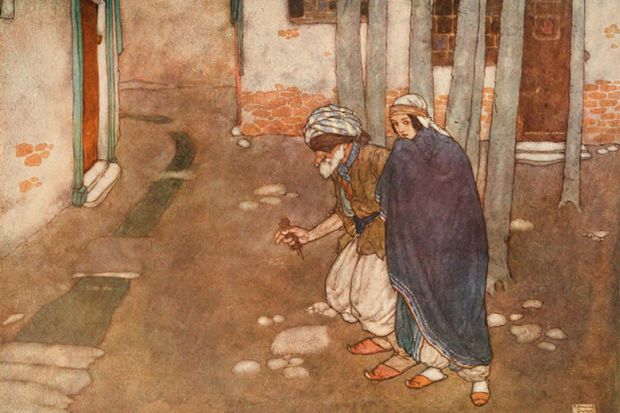In Nikolai Rimsky-Korsakov’s 1888 symphonic suite Scheherazade, the heroine’s part is distinct, her interventions signalled by a gorgeously sinewy violin solo threaded throughout the piece. It reminds us, lest we lose track, that amid the melee of harems, jinns and caliphs who make for the noisiest parts of the Arabian Nights, there is always a storyteller beneath the story, pulling the strings. It’s this insight that also compels Paolo Lemos Horta’s intelligent and engrossing new book.
Horta’s concern is not with Scheherazade, though, but rather the array of editors, travellers and translators through whose hands her stories passed over the course of the 18th and 19th centuries. The study begins with the first major European translator, Antoine Galland, and the Syrian Maronite monk Hanna Diyab, the mysterious source upon whom he relied for some of the most familiar Arabian Nights stories – including Aladdin and Ali Baba. Labelled “orphan tales”, these stories seemed to lack any verifiable provenance prior to Galland’s own transcriptions.
But in Horta’s research, the shadowy figure of Diyab, this spectral source, is marvellously fleshed out and made real. He takes us deep into Diyab’s notebooks and memoirs, filling in the real-life context of his encounters with Galland. Diyab remembers him vaguely as an “old man” translating the tales and “missing some nights”. “So,” he records in passing, deliciously offhand, “I told him the tales I knew.”
Tellingly, what Horta is able to surmise from Diyab’s own writing is evidence of narrative skill, a knack for deploying frame tales adroitly and injecting colour into varied social milieux. Horta reaches the astonishing conclusion that Diyab was not simply a passing storyteller to Galland’s master translator, but a “crucial contributor to the networks of creativity” that brought the Arabian Nights into European culture.
Horta’s research is evidently meticulous and deep, providing a fuller picture at nearly every important juncture in the publication history of the Arabian Nights. On Edward William Lane, the ardent Egyptologist and translator of the 1840 collection One Thousand and One Nights, Horta is both revealing and restrained. Lane understood his work as ethnography, and so devoted himself to recording “the manners and customs of the Arabs”. Horta persuasively reconstructs the context of Lane’s writing, reflecting on the culture of the coffee houses he frequented in Cairo, the Eastern dress he adopted to assimilate, even the circumcision he appears to have undertaken to better resemble his fellow Egyptian bathers in the hammam. Horta is politely unassuming about the question of Lane’s sexuality, but notes the intriguing problem posed by an Egyptian-Greek slave girl named Nefeeseh gifted him by a fellow expat Brit, and whom he evidently marries rather reluctantly. It’s an entirely fascinating story, diplomatically told.
Horta is less charitable in his account of the incorrigible Richard Burton, the British Arabist and explorer whose 1888 translations were shamelessly plagiarised and self-fashioned to fit his own proclivities. It leads to the nicely speculative argument that Burton’s particular fondness for the stories of the caliph Harun al-Rashid owes something to an over-identification with the cosmopolitan king by the reckless sexual adventurer. But the great merit of Horta’s book is that its interest always lies in the story of the story, in mapping out the complex network of the translators, editors and travellers behind the Arabian Nights, in ways that enrich our sense of this remarkable text.
Shahidha Bari is lecturer in Romanticism at Queen Mary University of London.
Marvellous Thieves: Secret Authors of the Arabian Nights
By Paolo Lemos Horta
Harvard University Press, 384pp, £22.95
ISBN 9780674545052
Published 26 January 2017
POSTSCRIPT:
Print headline: The tales’ many hidden tellers
Register to continue
Why register?
- Registration is free and only takes a moment
- Once registered, you can read 3 articles a month
- Sign up for our newsletter
Subscribe
Or subscribe for unlimited access to:
- Unlimited access to news, views, insights & reviews
- Digital editions
- Digital access to THE’s university and college rankings analysis
Already registered or a current subscriber? Login




